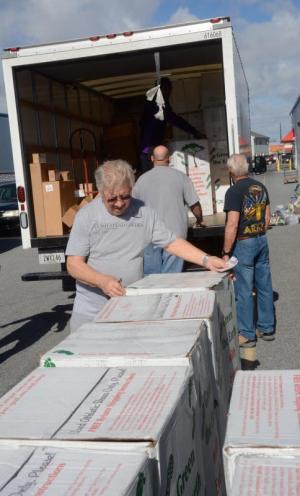Shoes and trees: There is a connection

Jim Riordon says there's an obvious connection between trees and used athletic shoes. He obviously saw something others didn't.
Each week, 3,000 pairs of gently used athletic shoes are processed in Lewes to assist villagers in far off African villages. Sales of the shoes help fund the Modular Organic Regenerative Environments project to improve the lives of farmers in Ghana.
And there is a direct connection between the shoes, trees and reduction of carbon in the atmosphere.
Shoes are collected at more than 3,000 locations nationwide – including YMCAs, fitness centers and shoe stores – and shipped pre-paid in large white boxes to a sorting warehouse at All Climate Storage Center in Lewes.
A staff of four sorts the shoes, grades them according to quality and boxes them again for shipping to overseas vendors at $4 per pair. Vendors then resell the shoes creating their own niche market.
Proceeds from sales are used by the organization to purchase tree seeds, tools and farming equipment, and to pay for staff.
The project has several prongs. Because shoes are recycled, they are kept out of landfills; sales of used shoes provide jobs and income; proceeds help fund the tree-farming program; and the planting of trees helps offset carbon emissions.
The idea is brainchild of Jim, a Lewes resident and retired custom-home builder, who is founder and director of the organization. He was looking for something to do to keep busy in his retirement.
Riordon said every pair of shoes pays for 10 tree seeds, and every tree planted offsets 2,000 pounds of carbon dioxide in the atmosphere. And when he starts rattling off the numbers, his face lights up. “That's about 20 million pounds of carbon we offset each month,” he said.
Jim said while their efforts are laudable, they are only touching the surface of possible donations. “We are missing 30 million shoes a year, and there are 1 billion unused athletic shoes sitting in closets right now,” he said. “We are only limited in what we can do by the numbers of shoes we collect.”
His wife, Sue, said the local YMCA was among the first to start collecting shoes on a regular basis. Over the past 10 years, the YMCA has donated nearly 4,000 pairs.
“Just think if we could get every one of the 2,700 YMCAs in the U.S. to do that. We could take a lot of people out of poverty,” Jim said.
Donations come from a variety of sources including fitness centers and athletic shoe stores.
First came the tomatoes
He started helping African farmers back in 1999 when he donated drip irrigation systems and millions and millions of tomato seeds to promote small-scale farming. Five years later he branched out to start an agroforestry project.
Over the years, he's been to Africa 17 times. Sue and son-in-law Cameron Weber, who run the business, are in Ghana this week. She didn't miss the opportunity to take some suitcases filled with germinating tree seeds with her.
On a trip 12 years ago, he was told by villagers that they could sell used athletic shoes, and the idea for the MORE project was born. He came home and asked members of Bethel United Methodist Church to take up a collection. That first month, in January 2006, they collected 50 pairs. Today, they collect 10,000 to 12,000 pairs per month.
It didn't take him long to put the components together and develop an overseas network – mostly in South America – to sell the shoes at $4 a pair. A small percentage of the shoes end up in Ghana to be sold by villagers.
Shipments of shoes come from all over the country and are processed in 20 mini-storage lockers. Riordon said he started with a shed in his backyard. “We've come a long way,” he said.
Trees help break cycle of poverty
Jim said there is a tangible way for farmers who make $400 a year to break the cycle of poverty, one tree at a time. He said during its lifespan a single mahogany tree can be worth up to $1,000.
Jim said each family has the potential to harvest $100,000 in fruits, nuts, lumber, hardwood and firewood over a 20-year period. “There are 5,000 products made from trees,” he said. “They can quadruple their annual income.”
Under the program, MORE staff assist participating villages in Ghana to establish a nursery, which can include wells and pumps. Up to 25,000 seeds are provided. Villagers attend classes to learn sustainable agroforestry techniques.
In Phase 2, trees are planted with assistance from a full-time nursery manager who stays on site for eight months. Each family is given up to 1,000 seedlings to start their own one-acre tree farm. Another 1,000 seedlings are planted in the second year. Jim said about 80 percent of the trees survive past the second year.
Farmers learn the importance of sustainable harvest and never cut down more than 5 percent of their trees per year, Riordon said. New trees can be moved from the village nursery once seeds have germinated in grow bags.
“We are seeing tremendous success stories,” Sue said.
Shoes can be dropped off at local locations such as New Balance, Anyone Fitness and Sussex Family YMCA and at All Climate Storage Center, 17485 Shady Road, Lewes, from 8 a.m. to 2 p.m. on weekdays.
• 1 million mixed tree seeds to Honduras
• 50 pairs of running shoes to Kenya
• 1 million mixed tree seeds to Ghana
• 280,000 tree seedlings to Ghana
• 10 churches in Ghana received trees
Go to morefoundationgroup.org for more information.





























































